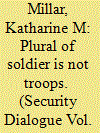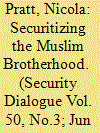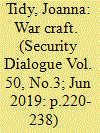|
|
|
Sort Order |
|
|
|
Items / Page
|
|
|
|
|
|
|
| Srl | Item |
| 1 |
ID:
165900


|
|
|
|
|
| Summary/Abstract |
This article discusses the role of private actors in the finance–security nexus. It analyses how the delegated authority bestowed upon private actors in anti-money laundering and combating terrorist financing (AML/CTF) may be perceived not as empowerment but as an expression of a threatening invasive and hegemonic order: To reap the possible benefits offered by the security paradigm in the ‘war on terror’, private actors must relinquish a degree of self-determinacy. This threat to self-determinacy, it is argued, foregrounds (affective) resistance among for-profit professionals. The article probes how for-profit professionals engage in (affective) resistance through self-authorship. Evoking Hansen’s discourse analysis on linkages and differentiation, the empirical analysis delineates how lawyers in the UK and France resist being resilient subjects in AML/CTF. It shows how for-profit professionals use self-authorship for purposes of (affective) resistance. Specifically, it finds that the linkages and counter-values subjects pin to the perceived invasive order of AML/CTF serve as poles in the fence protecting a space where professional identity is safeguarded. In this way, actors became resisting subjects when faced with obligations to be resilient. In conclusion, the article affords nuance to the role of private actors in the finance–security nexus by outlining how the forging of the first link in De Goede’s security chain is undermined.
|
|
|
|
|
|
|
|
|
|
|
|
|
|
|
|
| 2 |
ID:
165897


|
|
|
|
|
| Summary/Abstract |
This article identifies ‘the troops’ as a new, radically under-examined figure in the Western canon of war. Utilising discourse analysis of an original corpus of US ‘support the troops’ material from 2001 to 2010, the article argues that ‘the troops’ cannot be read as a simple aggregation of the figurative soldier or literal military personnel. Instead, ‘groupness of the troops’ shifts the politics of the legitimation of violence – and the possibility of meaningful dissent – in two distinct ways. Firstly, ‘the troops’ are figured, counterintuitively, as passive, dependent and at risk of suffering harm. This enables constructions of militaristic, heroic violence to coexist with empirical experiences of vulnerability without ideological contradiction. Secondly, though many accounts of militarism rely upon citizens’ aspirational identification with the ostensibly-universal soldier, the ‘groupness’ of the troops enables them to incorporate, rather than elide, substantive differences (e.g. race, gender or sexual orientation) through an all-encompassing relationship of ‘support’. Consequently, ‘the troops’ may be a more effective avatar of militarism than ‘the soldier’ – and far more important to the legitimation, depoliticization and even perpetuation of conflict than previously realized. What would the politics of military involvement in Afghanistan and Iraq have looked like absent the ‘escape valve’ of the figurative troops?
|
|
|
|
|
|
|
|
|
|
|
|
|
|
|
|
| 3 |
ID:
165901


|
|
|
|
|
| Summary/Abstract |
It is well established in the literature that migration has become increasingly securitized. In this article, we examine the racialized and gendered grids of intelligibility that make securitizing moves possible in the migration context. Specifically, we argue that the securitization of migration during the so-called EU refugee crisis comes into being through intertwined and mutually dependent representations of racialized, masculinized threat and racialized, feminized vulnerability, which are woven into the scaffolding of colonial modernity. We construct our argument through an analysis of relevant newspaper articles published in British newspapers between September 2015 and March 2016. Accordingly, our discussion advances understandings of the dominant narratives through which the ‘refugee crisis’ has been understood. In addition, in highlighting the naturalized inequalities that underpin securitizing speech acts, the article also contributes to literature that seeks to add an improved understanding of power to securitization theory.
|
|
|
|
|
|
|
|
|
|
|
|
|
|
|
|
| 4 |
ID:
165899


|
|
|
|
|
| Summary/Abstract |
Unprecedented levels of state violence against the Muslim Brotherhood, and the widespread acceptance of this violence by Egyptians following the July 2013 military coup, have been under-examined by scholars of both critical security studies and Middle East politics, reflecting implicit assumptions that state violence is unexceptional beyond Europe. This article explores how the deployment of such levels of violence was enabled by a securitization process in which the Egyptian military successfully appropriated popular opposition to Muslim Brotherhood rule, constructing the group as an existential threat to Egypt and justifying special measures against it. The article builds on existing critiques of the Eurocentrism of securitization theory, alongside the writings of Antonio Gramsci, to further refine its application to non-democratic contexts. In addition to revealing the exceptionalism of state violence against the Muslim Brotherhood and highlighting the important role of nominally non-state actors in constructing the Muslim Brotherhood as a threat to Egypt, the article also signals the role of securitization in re-establishing authoritarian rule in the wake of the 2011 uprising. Thus, we argue that securitization not only constitutes a break from ‘normal politics’ but may also be integral to the reconstitution of ‘normal politics’ following a period of transition.
|
|
|
|
|
|
|
|
|
|
|
|
|
|
|
|
| 5 |
ID:
165898


|
|
|
|
|
| Summary/Abstract |
This article makes the case for examining war from what Stephanie Bunn calls a ‘making point of view’. Makers and their material production of and for war have been neglected in our accounts of war, security and international relations. An attention to processes of making for war can reveal important things about how such processes are lived and undertaken at the level of the body. The article focuses on the particular phenomena of martial craft labour – the recreational making of ‘stuff’, including hats and pillowcases, by civilians for soldiers. To explore embodiment within this social site, an ethnographic method is outlined that enables the reading of objects as embodied texts, the observation of others in processes of making, and the undertaking of making by the researcher. Analysing embodied registers of aesthetic expression and the social values that attend such crafting for war reveals how this making is a space through which intimate embodied, emotional circulations undertake work for liberal-state and military-institutional logics and objectives, obscure violence, normalize war, and produce the military as an abstract social cause. Beyond the immediate empirical focus of this article, a much wider political entanglement of violence, embodiment and material production necessitates a concerted research agenda.
|
|
|
|
|
|
|
|
|
|
|
|
|
|
|
|
|
|
|
|
|